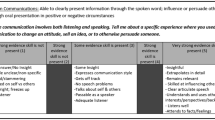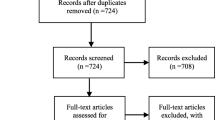Abstract
Learning theories, which suggest that experienced faculty use collaborative teaching styles, are reflected in qualitative studies of learners in hospital settings. However, little research has used resident focus groups to explore characteristics of successful teachers in outpatient clinics. Therefore, focus group discussions with first through third-year internal medicine residents at a large academic medical center were conducted to better understand residents’ perspectives on effective outpatient teaching. A group facilitator solicited residents’ reflections, based on their lived experiences, on teaching domains from previous factor analytic studies: interpersonal, clinical-teaching, and efficiency. Researchers coded focus group transcripts and identified themes within the domains. Final themes were determined by consensus. Leading themes were “kindness” and “teacher–learner relationships.” Junior residents were sensitive to faculty who were brusque, harsh, and degrading. Senior residents respected faculty who were humble, collaborative, and allowed residents to co-manage teaching encounters. Seniors emphasized the importance of faculty role-modelling and preferentially staffed with experts to “gain wisdom from experience.” Overall, residents expressed that effective learning requires grounded teacher–learner relationships. These findings support learning theories and previous factor analytic studies. However, this qualitative study provided insights that could not be gleaned from assessment scores alone.
Similar content being viewed by others
References
Beckman, T. J. (2004). Lessons learned from a peer review of bedside teaching. Academic Medicine, 79, 343–346.
Beckman, T. J. (2007). Determining the validity and reliability of clinical assessment scores. In M. C. Henderson (Ed.), A textbook for internal medicine education programs (pp. 139–146). Washington, DC: Association of Program Directors in Internal Medicine and Association of Specialty Professors.
Beckman, T. J., & Cook, D. A. (2007). Developing scholarly projects in education: A primer for medical teachers. Medical Teacher, 29, 210–218.
Beckman, T. J., Cook, D. A., & Mandrekar, J. N. (2006). Factor instability of clinical teaching assessment scores among general internists and cardiologists. Medical Education, 40, 1209–1216.
Beckman, T. J., Ghosh, A. K., Cook, D. A., Erwin, P. J., & Mandrekar, J. N. (2004). How reliable are assessments of clinical teaching? A review of the published instruments. Journal of General Internal Medicine, 19, 971–977.
Beckman, T. J., & Lee, M. C. (2009). Proposal for a collaborative approach to clinical teaching. Mayo Clinic Proceedings, 84, 339–344.
Beckman, T. J., & Mandrekar, J. N. (2005). The interpersonal, cognitive, and efficiency domains of clinical teaching: Construct validity of a multidimensional scale. Medical Education, 39, 1221–1229.
Brookfield, S. D. (1986). Understanding and facilitating adult learning. San Francisco: Jossey-Bass.
Calman, K. C., & Donaldson, M. (1991). The pre-registration house officer year: A critical incident study. Medical Education, 25, 51–59.
Castiglioni, A., Shewchuk, R. M., Willett, L. L., Heudebert, G. R., & Centor, R. M. (2008). A pilot study using nominal group technique to assess residents’ perceptions of successful attending rounds. Journal of General Internal Medicine, 23, 1060–1065.
Cook, D. A., & Beckman, T. J. (2006). Current concepts in validity and reliability for psychometric instruments: Theory and application. American Journal of Medicine, 119, e7–e16.
Corbin, J., & Strauss, A. (2008). Basics of qualitative research. Thousand Oaks: Sage.
Crabtree, B. F., & Miller, W. L. (1999). Doing qualitative research (2nd ed.). Thousand Oaks: Sage Publications.
Cresswell, J. W. (2003). Research design: Qualitative, quantitative, and mixed methods approaches (2nd ed.). Thousand Oaks: Sage Publications.
Durning, S. J., Cation, L. J., & Jackson, J. L. (2003). The reliability and validity of the American Board of Internal Medicine Monthly Evaluation Form. Academic Medicine, 78, 1175–1182.
Haidet, P., & Stein, H. F. (2006). The role of the student–teacher relationship in the formation of physicians. The hidden curriculum as process. Journal of General Internal Medicine, 21, S16–S20.
Hayes, D. M., Fleury, R. A., & Jackson, T. B. (1979). Curriculum content from critical incidents. Medical Education, 13, 175–182.
Irby, D. M. (1992). How attending physicians make instructional decisions when conducting teaching rounds. Academic Medicine, 67, 630–638.
Irby, D. M. (1994). What clinical teachers in medicine need to know. Academic Medicine, 69, 333–342.
Knowles, M. S., Holton, E. F., & Swanson, R. A. (2005). The adult learner. London: Elsevier.
Maslow, A. H. (1971). The farther reaches of human nature. New York: Viking Press.
Mattern, W. D., Weinholtz, D., & Friedman, C. P. (1983). The attending physician as teacher. New England Journal of Medicine, 308, 1129–1132.
McLeod, P. J., James, C. A., & Abrahamowicz, M. (1993). Clinical tutor evaluation: A 5-year study by students on an in-patient service and residents in an ambulatory care clinic. Medical Education, 27, 48–54.
Metcalfe, D. H., & Matharu, M. (1995). Students perception of good and bad teaching: Report of a critical incident study. Medical Education, 29, 193–197.
Miles, M. B., & Huberman, A. M. (1994). Qualitative data analysis. Thousand Oaks: Sage Publications.
O’Malley, P. G., Kroenke, K., Ritter, J., Dy, N., & Pangaro, L. (1999). What learners and teachers value most in ambulatory educational encounters: A prospective qualitative study. Academic Medicine, 74, 186–191.
Palmer, P. J. (2007). The courage to teach. San Francisco: Jossey-Bass.
Pangaro, L. (1999). A new vocabulary and other innovations for improving descriptive in-training evaluations. Academic Medicine, 74, 1203–1207.
Patton, M. Q. (2002). Qualitative research & evaluation methods (3rd ed.). London: Sage Publications.
Silber, C. G., Nasca, T. J., Paskin, D. L., Eiger, G., Robeson, M., & Voleski, J. J. (2004). Do global rating forms enable program directors to assess the ACGME competencies? Academic Medicine, 79, 549–556.
Skeff, K. M. (1988). Enhancing teaching effectiveness and vitality in the ambulatory setting. Journal of General Internal Medicine, 3, S26–S33.
Stern, D. T., Williams, B. C., Gill, A., Gruppen, L. D., Woolliscroft, J. O., & Grum, C. M. (2000). Is there a relationship between attending physicians’ and residents’ teaching skills and students’ examination scores? Academic Medicine, 75, 1144–1146.
Stewart, J. (2008). To call or not to call: A judgment of risk by pre-registration house officers. Medical Education, 42, 938–944.
Stritter, F. T., & Baker, R. M. (1982). Resident preferences for the clinical teaching of ambulatory care. Journal of Medical Education, 57, 33–41.
Sutkin, G., Wagner, E., Harris, I., & Schiffer, R. (2008). What makes a good clinical teacher in medicine? A review of the literature. Academic Medicine, 83, 452–466.
Torre, D. M., Daley, B. J., Sebastian, J. L., & Elnicki, D. M. (2006). Overview of current learning theories for medical educators. American Journal of Medicine, 119, 903–907.
Williams, K. N., Ramani, S., Fraser, B., & Orlander, J. D. (2008). Improving bedside teaching: Findings from a focus group study of learners. Academic Medicine, 83, 257–264.
Williams, G. C., Wiener, M. W., Markakis, K. M., Reeve, J. M., & Deci, E. L. (1994). Medical students’ motivation for internal medicine. Journal of General Internal Medicine, 9, 327–333.
Wortham, S. (2004). The interdependence of social identification and learning. American Education Research Journal, 41, 715–750.
Wright, S. M., Kern, D. E., Kolodner, K., Howard, D. M., & Branciati, F. L. (1998). Attributes of excellent attending-physician role models. New England Journal of Medicine, 339, 1986–1993.
Acknowledgment
Presented at the Association for Medical Education in Europe (AMEE) Annual Meeting, Prague, Czech Republic, 30 August–4 September 2008.
Author information
Authors and Affiliations
Corresponding author
Rights and permissions
About this article
Cite this article
Kisiel, J.B., Bundrick, J.B. & Beckman, T.J. Resident physicians’ perspectives on effective outpatient teaching: a qualitative study. Adv in Health Sci Educ 15, 357–368 (2010). https://doi.org/10.1007/s10459-009-9202-2
Received:
Accepted:
Published:
Issue Date:
DOI: https://doi.org/10.1007/s10459-009-9202-2




